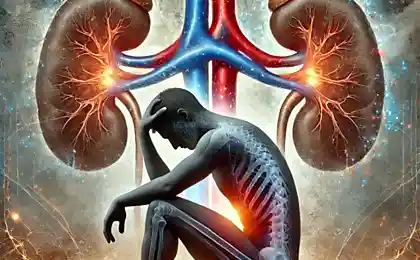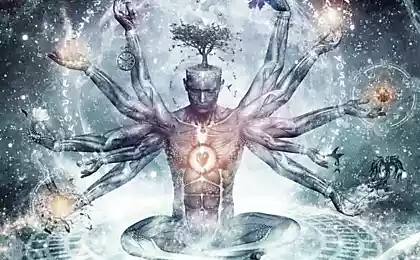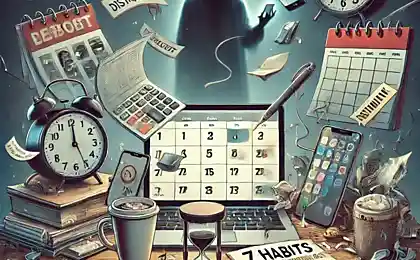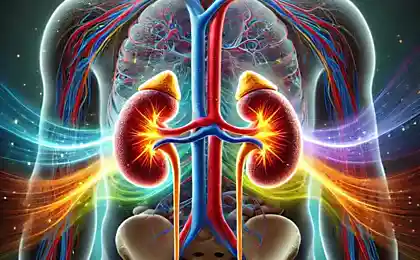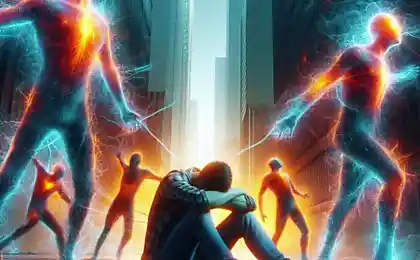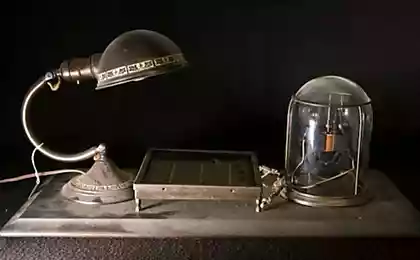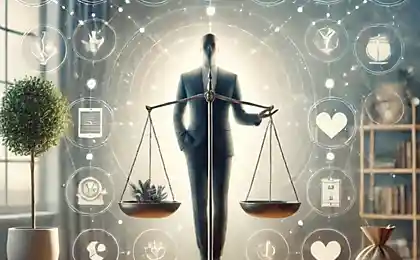178
11 Non-Obvious Thieves of Your Energy: How to Stop Your Power Leak
“I’m like a battery”: what imperceptibly depletes your resources even with a perfect sleep

A University of California (2023) study found that 68 percent of people who complain of chronic fatigue get enough sleep. Reason? Hidden energy vampires From toxic perfectionism to digital hypoxia. Learn how science explains these phenomena and what to do about them.
Energy loss of the new time: what did not take into account your sleep tracker
1. Deferred life syndrome
Neuroscientists at MIT found that continual planning ("starting Monday") increases cortisol levels by 19 percent, as the brain perceives promises as unfinished tasks. Solution: make checklists with the item "Refuse ...".
2. Hyperprotection over adults
A study in the Journal of Social Psychology found that controlling a partner or children requires 420 kcal/day — like an hour of Zumba. Psychologists call this “emotional bacon” – imperceptible, but high-calorie.

3. Digital hypoxia
According to Nature Human Behaviour, social media scrolling narrows peripheral vision, causing a false sense of lack of oxygen. The result: the brain spends 12% of its resources on “simulating choking.”
4. Unlived emotions
Accumulated anger, according to the Mayo Clinic, slows mitochondrial ATP synthesis by 27%. Simply put, every unspoken resentment “steals” the energy of the cells.
5. Perfectionism 2.0
The pursuit of idealism in the age of Instagram causes phantom failure. Neuroscientists have found that the brain of a perfectionist spends 34% of energy on modeling negative scenarios.
6. Mental multi-tasking
Switching between 3+ tasks creates "cognitive debt" - the brain consumes 41% more glucose (University of Sussex study). Experiment: Try brushing your teeth with your left hand - this trains focus.

7. The "broken time" effect
Short work meetings of 15-25 minutes increase adrenaline production by 2.3 times (Harvard Business Review). The secret of Japanese IT companies: “hourly slots” with a 50-minute focus and 10 minutes of doing nothing.
8. Excessive politeness
The constant use of softener words (“sorry, can I...”) activates the islet lobe of the brain responsible for pain. Linguists advise: replace “I am not difficult” with “I choose to help”.
9. An unconscious noise
The background hum of cities (45-55 dB) increases cortisol levels even in sleep. An experiment with pink earplugs showed that this returns 18% of the energy of the REM phase.
10. Genetic anxiety
A study of the DNA of 100,000 Europeans found that carriers of the ADRA2B allele are 68% more likely to feel “background fatigue”. Rescue - adaptogens: Rhodiola pink reduces the expression of this gene.
11. Empty refrigerator syndrome
Neurogastroenterologists have proved that the sight of semi-empty shelves provokes the release of ghrelin - the hunger hormone, which simultaneously causes anxiety. Lifehack: Store cereals in transparent banks.
How to Restore Energy: A Protocol from the Future
Nobel laureate Andrew Huxley recommends:
As the Tibetan saying goes, “The lamp does not burn without oil, but it is important to close the cracks in the vessel.” Perhaps, before adding new things to the schedule, it is worth patching the holes through which your forces drain.

A University of California (2023) study found that 68 percent of people who complain of chronic fatigue get enough sleep. Reason? Hidden energy vampires From toxic perfectionism to digital hypoxia. Learn how science explains these phenomena and what to do about them.
Energy loss of the new time: what did not take into account your sleep tracker
1. Deferred life syndrome
Neuroscientists at MIT found that continual planning ("starting Monday") increases cortisol levels by 19 percent, as the brain perceives promises as unfinished tasks. Solution: make checklists with the item "Refuse ...".
2. Hyperprotection over adults
A study in the Journal of Social Psychology found that controlling a partner or children requires 420 kcal/day — like an hour of Zumba. Psychologists call this “emotional bacon” – imperceptible, but high-calorie.

3. Digital hypoxia
According to Nature Human Behaviour, social media scrolling narrows peripheral vision, causing a false sense of lack of oxygen. The result: the brain spends 12% of its resources on “simulating choking.”
4. Unlived emotions
Accumulated anger, according to the Mayo Clinic, slows mitochondrial ATP synthesis by 27%. Simply put, every unspoken resentment “steals” the energy of the cells.
5. Perfectionism 2.0
The pursuit of idealism in the age of Instagram causes phantom failure. Neuroscientists have found that the brain of a perfectionist spends 34% of energy on modeling negative scenarios.
6. Mental multi-tasking
Switching between 3+ tasks creates "cognitive debt" - the brain consumes 41% more glucose (University of Sussex study). Experiment: Try brushing your teeth with your left hand - this trains focus.

7. The "broken time" effect
Short work meetings of 15-25 minutes increase adrenaline production by 2.3 times (Harvard Business Review). The secret of Japanese IT companies: “hourly slots” with a 50-minute focus and 10 minutes of doing nothing.
8. Excessive politeness
The constant use of softener words (“sorry, can I...”) activates the islet lobe of the brain responsible for pain. Linguists advise: replace “I am not difficult” with “I choose to help”.
9. An unconscious noise
The background hum of cities (45-55 dB) increases cortisol levels even in sleep. An experiment with pink earplugs showed that this returns 18% of the energy of the REM phase.
10. Genetic anxiety
A study of the DNA of 100,000 Europeans found that carriers of the ADRA2B allele are 68% more likely to feel “background fatigue”. Rescue - adaptogens: Rhodiola pink reduces the expression of this gene.
11. Empty refrigerator syndrome
Neurogastroenterologists have proved that the sight of semi-empty shelves provokes the release of ghrelin - the hunger hormone, which simultaneously causes anxiety. Lifehack: Store cereals in transparent banks.
How to Restore Energy: A Protocol from the Future
Nobel laureate Andrew Huxley recommends:
- 20-minute “wake-up” (lie down without gadgets)
- Breathing 4-8-12 (inhale at 4, delay at 8, exhale at 12)
- “Genetic nutrition”: Brazil nuts for carriers of the MTHFR gene
As the Tibetan saying goes, “The lamp does not burn without oil, but it is important to close the cracks in the vessel.” Perhaps, before adding new things to the schedule, it is worth patching the holes through which your forces drain.
Why 10,000 Steps a Day is an Outdated Myth and Walking is the Medicine of the Future
Diogenes syndrome: why people turn their homes into landfills





